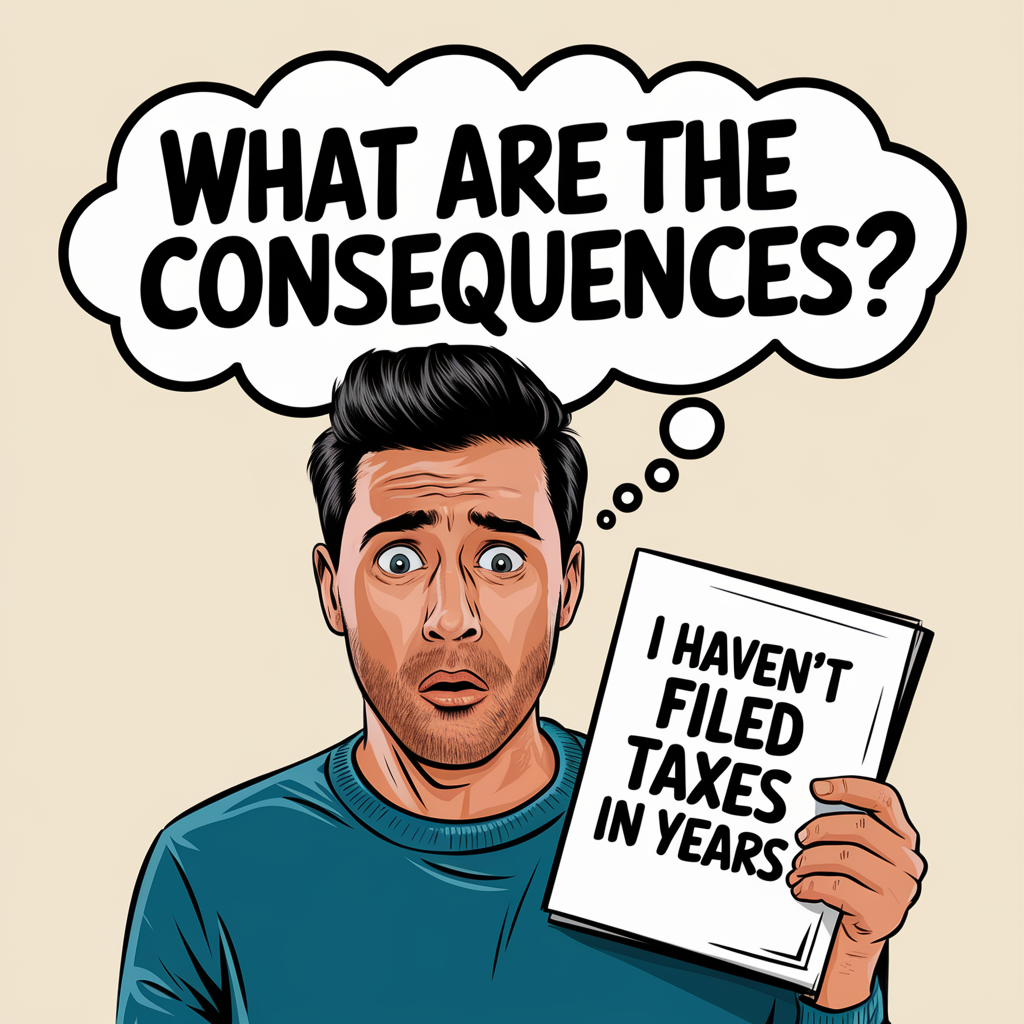Haven’t Filed Taxes in 5 Years? Consequences & Options

- What to expect if you haven’t filed taxes in five years
- IRS notices and enforcement actions
- What happens if you haven’t filed business taxes
- How the IRS files a Substitute for Return (SFR)
- Filing your back taxes even if you’re missing documents
- Why you should file as soon as possible—even if you can’t pay
- How to get professional help to resolve your tax issues
- Failure-to-file penalty: 5% per month (up to 25% of the total tax due)
- Failure-to-pay penalty: 0.5% per month (up to 25%)
- Interest on unpaid taxes: Accrues daily based on current IRS interest rates
- Tax liens: The IRS places a legal claim against your property
- Wage garnishments: The IRS takes a portion of your paycheck
- Bank levies: The IRS seizes money directly from your bank accounts
- Seizure of assets: The IRS can take personal or business assets to satisfy the debt
- The IRS only includes known income (W-2s, 1099s, etc.)
- No deductions, credits, or business expenses are included
- The result is an inflated tax debt that is harder to reduce
- CP59 Notice: First notice informing you of unfiled returns
- CP2566 Notice: IRS intent to file a Substitute for Return
- CP504 Notice: Final warning before levy action
- Notice of Federal Tax Lien: Public record showing you owe taxes
- Intent to Levy Notice (LT11 or CP90): Final notice before the IRS seizes assets
- Higher tax liability: The IRS assumes maximum profit with no deductions
- Loss of deductions & credits: Business expenses and write-offs are forfeited
- Payroll tax penalties: If you had employees and failed to file payroll taxes, penalties can be severe
- Potential criminal charges: If the IRS believes there is willful tax evasion, legal consequences may follow
- Installment Agreements: Pay over time
- Offer in Compromise (OIC): Settle for less than owed
- Currently Not Collectible (CNC): Temporary relief if you can’t afford payments
Will I go to jail if I haven’t filed my taxes for five years?
While failing to file taxes is serious, jail time is rare for most taxpayers. The IRS is more focused on collecting unpaid taxes than criminal prosecution. However, if you willfully evade taxes or commit fraud, criminal charges are possible. Filing as soon as possible can help avoid legal consequences.
Can I still get a refund if I file late?
The IRS allows refunds to be claimed up to three years from the original due date of the return. Since you haven’t filed in five years, you’ve likely lost refunds for at least two years. However, filing now can prevent further loss of refunds.
What if I don’t have the money to pay back taxes?
Even if you can’t pay the full amount, you should still file. The IRS offers payment plans, hardship status, and settlement options like Offer in Compromise (OIC), which may allow you to pay less than what you owe.
How do I know if the IRS has filed a Substitute for Return (SFR) for me?
You can check by requesting an IRS transcript or reviewing any notices the IRS has sent, particularly a CP2566 Notice or an SFR assessment letter. If the IRS has filed an SFR, it’s usually in your best interest to file a proper return to claim deductions and credits.
Can I file my back taxes myself, or do I need a CPA?
While it’s possible to file on your own, working with a qualified CPA or tax professional can help you avoid costly mistakes, negotiate with the IRS, and ensure you claim all eligible deductions.
What happens if I ignore my unfiled taxes?
The IRS can take aggressive action, including tax liens, wage garnishments, and bank levies. Ignoring the problem won’t make it go away—taking action now can help prevent enforcement.
Does California have its own penalties for not filing state taxes?
Yes. If you live in Orange County or anywhere in California, the Franchise Tax Board (FTB) can impose additional penalties and collection actions, similar to the IRS. Filing with both federal and state agencies is crucial.
How soon should I act?
Immediately! The longer you wait, the more penalties and interest accrue. Plus, the IRS may escalate collection efforts. Contact our Orange County office today to start resolving your tax issues before it’s too late.
Frequently Asked Questions














